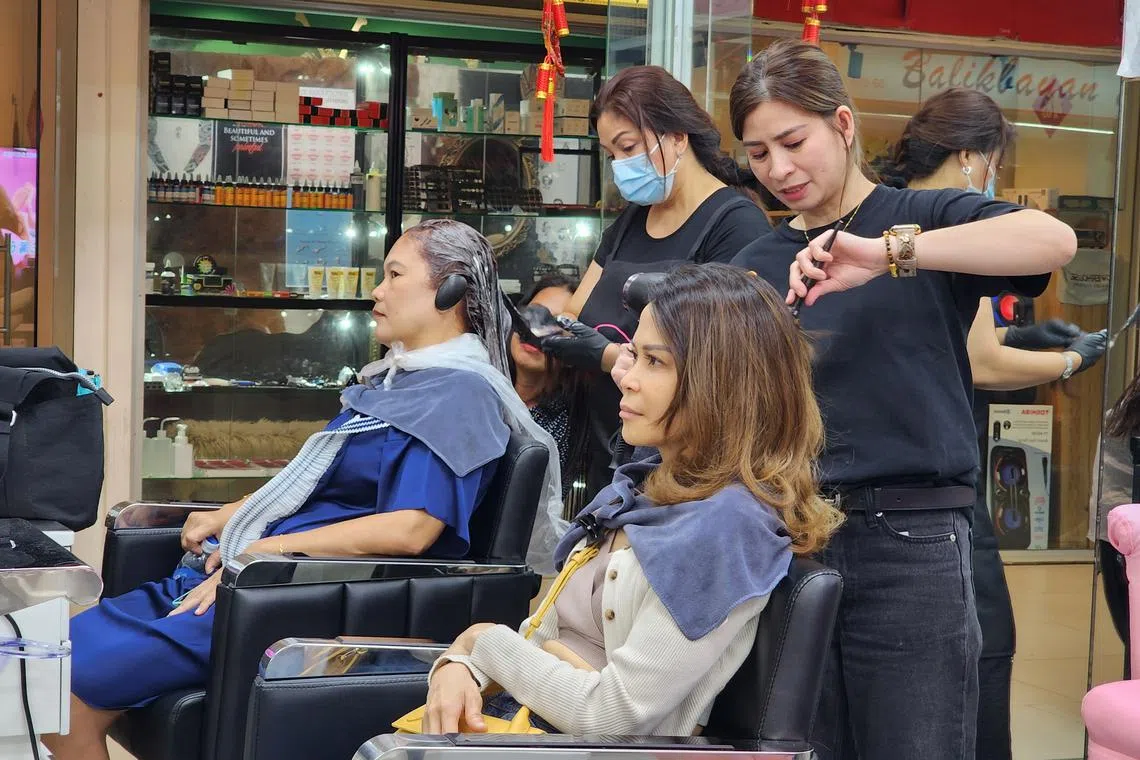For Filipino Catholics in Singapore, Pope’s visit is a time to reckon with changes to their faith
Sign up now: Get ST's newsletters delivered to your inbox

Ms Nicolas (standing, right), who owns a beauty salon, is hoping the Catholic Church will be less hostile to divorce.
ST PHOTO: RAUL DANCEL
Follow topic:
SINGAPORE - For Filipino Catholics in Singapore, Pope Francis’ visit next week is an opportunity not just to celebrate their faith but also to reaffirm it, as they come to terms with their leader’s more progressive ideas and as they navigate a multi-religious, more secular society.
“It will be a big event,” said Ms Joy Cardoza, a 41-year-old domestic worker.
She said the church she goes to every Sunday has been abuzz over the historic papal visit.
“There were souvenirs and memorabilia everywhere. Everyone’s excited,” she said.
There are more than 200,000 Filipinos currently living in Singapore, nearly all of them born into the Catholic faith.
Ms Cardoza said she put her name in the Papal mass ballot,
Ms Mae Santos, 48, an architectural coordinator, managed to land a slot for the mass that the 87-year-old pontiff will celebrate at the 50,000-seat National Stadium on Sept 12.
She said she does not relish the thought of having to queue for four hours before the mass can even start.
“But I still want to do it because it’s a once-in-a-lifetime event. Some go to Rome just to see the Pope. This time, he’s coming to us,” she said.
The visit is also an opportune moment for Filipino Catholics in Singapore to reckon with the changes that their faith is going through under Pope Francis’ liberal papacy.
He has, for instance, preached tolerance and openness
Ms Shaey Nicolas, 44, who owns a beauty salon at Lucky Plaza, said she agrees with the Pope on this score. “We all deserve to be blessed. We are all sinners after all. We are human. We make mistakes. But God accepts us all,” she said.
But Ms Cardoza, who counts many gays and lesbians as friends and agrees that they should not be discriminated against, said it is right for the church to draw the line at same-sex union.
“Marriage should still be between a man and a woman,” she said. “I don’t judge same-sex couples who are living together. But marriage, for me, is still a sacred Catholic rite.”
Ms Santos shares that conviction.
She said she sees nothing wrong with priests blessing gay couples, but the Pope “didn’t say to make it sacramental”.
“What I’m hearing him say is that in every way, we should act out of love: We should love our neighbours and be more accepting of them,” she said.
Their views on divorce are just as nuanced, although these tend to reflect sentiments from back home.
Surveys conducted by polling company Social Weather Stations show a shift in attitudes among Filipinos towards divorce.
In 2005, 43 per cent of Filipinos supported legalising divorce “for irreconcilably separated couples”, while 45 per cent disagreed.
The same survey in 2017 showed 53 per cent in favour, while only 32 per cent disagreed.

Surveys conducted by polling company Social Weather Stations show a shift in Philippine attitudes towards divorce, especially among Filipino migrant workers in Singapore.
ST PHOTO: RAUL DANCEL
Still, the Philippines – largely because of the Catholic Church’s considerable sway – is the only country in the world outside of the Vatican where divorce is illegal.
The push to legalise divorce in the Philippines is especially strong among Filipino domestic workers, who have had to spend years away from their families and, because of that, suffer wounds that emerge from incessant conflicts over money and responsibilities with their spouses.
Ms Cardoza said she counts herself lucky that she has managed to keep her family intact despite having been away from them most of the time for close to two decades.
But she has many friends who have not been as fortunate, with husbands who live off their earnings and yet still have the temerity to indulge in their vices and take in mistresses.
Ms Cardoza said she wishes the Catholic Church in the Philippines would ease up on its opposition to a Bill currently in Congress that would legalise divorce.
“If a marriage is no longer healthy, why continue? If it just keeps ending up in violence, why not set each other free?” she said.
Ms Nicolas said it should not be too expensive or take too long to walk away from an abusive relationship.
She herself had her first marriage annulled and is now married to a Singaporean. “I had to wait many years and spend many thousands of pesos,” she said.
She said it could have been much simpler and less expensive had there been a divorce law in effect in the Philippines.
But for Ms Santos, who is still single, divorce “is an attack on the core of our Catholic faith, which is marriage and family”.
“There will be more problems with blended families if children are not brought up in a serious, committed relationship,” she said. “It might affect the quality of commitment people will make if the option of divorce is there.”
So, how has living in Singapore – with its plethora of faiths and a more secular way of doing things – impacted their Catholicism?
Ms Santos, who has been in Singapore for 16 years, said it made her even more spiritual.
“Here, because I am away from my family, my church friends become my family. In that regard, the friendship is deeper, not just superficial,” she said.
She said the presence of people around her with different religious beliefs had “made me more ecumenical”. “It made me concentrate not on the differences but on the things we have in common, on the similarities rather than the differences,” she said.
Ms Nicolas said her father and many of her uncles, aunts and friends in Singapore have left the Catholic faith and switched to other Christian denominations.
She said she probably would have made the jump herself, but admitted that she is not a very religious person, and already has her hands full running her business.
“But I still have my faith,” she said, adding that knowing Pope Francis will next week be just a few kilometres away is a comforting thought.


